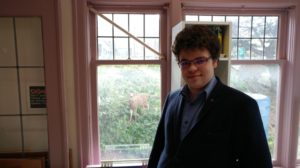Have you ever wondered about the Camosun students writing the articles you read in Nexus? Know Your Writers will help you dive into the minds of the writers behind the stories.
This issue, we talked to contributing writer Aaron Stefik about staying in Victoria, fighting biases, and how satire can be misunderstood.

What drew you to journalism?
Storytelling is the first and last word in every aspect of my life, and in reality; when reported accurately, it provides for many wonderful stories. Telling them excites me more than most else, so it seemed fitting. That aside, so many of my childhood heroes have been journalists in one capacity or another: George Orwell, Mark Twain, Ernest Hemingway, and on it goes. Perhaps most importantly, I see journalism as the work of exposing and fighting the biases of one’s own spirit as they try to worm themselves into what should be objective writing, if such a thing does indeed exist. Wherever writing is concerned, I like to believe that I enjoy a challenge more than most.
What is the most awkward moment you have had in an interview?
In the energy of the moment, it’s very easy to mistakenly imply something that wasn’t at all intended, and I’ve fallen prey to that trap more than once. Once, while interviewing someone rather high-profile about a political issue, he took a comment of mine comparing one aspect of a financial system here in British Columbia with one in Newfoundland to mean I was comparing their entire economies, so I found myself treated to a several-minute lecture on the differences between the economies of BC and Newfoundland, albeit by my own error.
What would you say are the worst and best parts of your job at the paper?
As a satirist, I adore the opportunity to explore new ground and broach topical work, but I also worry not infrequently that my selected style and methods may be taken to imply something which they do not. In that sense, the question is raised constantly for me how a given audience will respond to my work, and whether their response will be based upon a misunderstanding of the work, or on a fundamental issue they take with my genuine position. In turn, this gives rise to the question of whether any misinterpretations stem from my own errors or those on the part of a reader. Humans are fickle creatures, and I as much as any.
Why did you originally come to Camosun?
My intent of completing my history degree at UBC and my current living situation made it the practical choice. Camosun offers a quiet, almost familial relationship with one’s professors, which is ideal in lower-division courses.
What do you enjoy doing in your spare time?
I often tell people that the two things in this world that I understand are fiction and history. So, naturally, I spend a huge proportion of my time reading, watching, and researching. However, I’m also pursuing a career as a voice actor for animation voiceover in Vancouver. I also write fiction. I’m sure I’ve already seen far too much anime, as well. There’s something spectacular and humbling about embracing all genres and mediums of storytelling and allowing them to take us where they will so that we may enjoy or detest them purely on their own merits.
